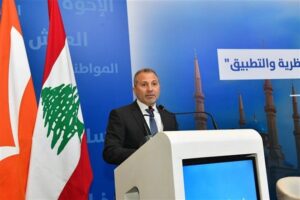In a powerful appeal, MP Gebran Bassil calls for urgent action to secure the return of displaced Syrians, defend Lebanon’s identity, and restore full national sovereignty.
The President of the Free Patriotic Movement, MP Gebran Bassil, emphasized that Lebanon today is witnessing a troubling silence regarding the return of Syrian refugees to their country. In an interview with Lebanon Debate’s “Spot Shot” program, he stated:
“The Free Patriotic Movement will commemorate April 26 and demand the departure of the ‘Syrian refugee army’ from Lebanon, as there is no longer any reason for their continued presence.”
Bassil clarified: “We do not seek to incite or create conflict with the Syrian people. Syria is our neighbor, and we desire the best relations with it. Syrians residing legally among us, who possess valid work permits and legal residency, are not a problem. However, the situation of illegal refugees must be addressed. After the fall of the Syrian regime, the pretext for their prolonged stay in Lebanon no longer exists.”
He warned that:
“The Lebanese government’s approach is dangerous, legitimizing an illegal presence that has become a form of human occupation. Over two million Syrians now reside here, with a density reaching 200 to 250 displaced persons per square kilometer — a clear threat to our national identity.”
Bassil stressed that Lebanese sovereignty is gravely compromised by the presence of two million foreigners residing on our land against the will of the Lebanese people. He added:
“Maintaining Syrian refugees in Lebanon despite the disappearance of the reasons that brought them here constitutes a violation of both national and international law. Initially, humanitarian cases were admitted based on strict criteria — economic migrants were not permitted — but today, even those criteria are ignored.”
He continued:
“Since 2011, we resisted alone. Now, we hope that others will join us to achieve this demand. Sadly, many parties did not support us on the issue of Syrian displacement, succumbing instead to foreign influence.”
Bassil explained the political context:
“Before the fall of the former Syrian regime, internal conditions were developing that encouraged displacement. In 2011, refugees were viewed as a political and military asset against the regime. After the regime survived, the refugees became a pressure card for negotiations. Today, with the regime’s fall and a new reality in Syria, there is no remaining justification for the refugees to stay — yet the international community’s will still prevents their return.”
He highlighted the consistent position of President Michel Aoun, who, on every international platform, firmly defended Lebanon’s right to resolve the refugee issue independently, refusing to yield to external pressures.
“The international community is indebted to Lebanon for carrying the burden of a crisis it did not create,” Bassil said. “International institutions must now compensate Lebanon for the enormous losses incurred.” He emphasized that the return of displaced Syrians can and must be achieved through determined pressure.
Bassil outlined a comprehensive approach:
“We must undertake awareness-raising campaigns, human rights advocacy, institutional efforts, and humanitarian initiatives.”
He recalled: “The first law I submitted to Parliament as an MP addressed Syrian displacement. Although we submitted seven draft laws on this issue, regrettably, none were passed.”
He added:
“Our latest proposed law stipulates that Syrians must leave Lebanon within six months, except for those with legal status.”
He stressed: “There is a major disconnect between the aspirations of the Lebanese people and the government’s inaction. Today, the regime that triggered displacement no longer exists.”
Bassil made it clear:
“Lebanon is not responsible for Syria’s internal security. There are no ongoing protests or conflict there. Refugees were displaced because of war; now international standards must be applied fairly. Yet the world imposes double standards on Lebanon.”
He affirmed: “We will succeed in ensuring the Syrians’ departure, but time is working against us.”
Reflecting on past experiences, Bassil recalled being attacked by As-Safir newspaper when he advocated for the proper registration of Syrian births in Lebanon to prevent long-term demographic change.
“They accused me of racism,” he said, “but the reality is that unregulated birth registration leads to irreversible changes to Lebanon’s identity.”
He referred to the 1994 naturalization decree, warning:
“Today, many municipalities have already lost their historic character due to naturalizations. Citizenship must be reserved for those with true Lebanese roots, not granted to those with no genuine connection to Lebanon.”
Switching topics, Bassil described the Movement’s historical role:
“Before the 1990s, we were engaged in military resistance while rooted in legitimate national aspirations. In 2005, we returned to Parliament but remained outside government until 2008. Even after entering government, we did not hold real power until the election of President Aoun in 2016.”
He noted:
“In 2022, we once again exited the government, finding ourselves in a position similar to 2005–2008: part of the state but outside the ruling power.”
Bassil defended the Movement’s achievements during President Aoun’s tenure:
“We accomplished much: from Fajr al-Juroud to electoral reforms, oil and gas decrees, and budget approvals after years of paralysis. Admittedly, it was less than we aspired to accomplish, but it was meaningful nonetheless.”
He emphasized:
“The challenge is not to attack each other, but to cooperate for the nation’s good. Unfortunately, lacking a majority in Parliament or government, and with the President’s limited constitutional powers, we faced major obstacles.”
Bassil affirmed that the withdrawal of the Syrian army in 2005 was not a surprise but the result of persistent struggle and convergence between internal and external pressures following the martyrdom of Prime Minister Rafik Hariri.
On Hezbollah’s weapons, Bassil stated clearly:
“We support the exclusive ownership of weapons by the Lebanese state. Hezbollah has lost the Lebanese people’s trust by using its weapons in ways that do not align with national interests. Our position remains that Lebanon must remain neutral to shield itself from regional conflicts.”
Reflecting on his early political path, Bassil recounted visiting General Aoun in exile in France in 1993.
“General Aoun always insisted on peaceful struggle to end the occupation. His strength was moral and political, not military,” he said.
He praised Aoun’s unwavering commitment:
“President Aoun taught us that while one might be crushed, one must never surrender or sign unjust agreements. His resistance and refusal to compromise earned him enduring respect.”
Bassil concluded:
“We were the only ones who stood firmly against occupation, even as others sought power. By March 14, 2005, we had mobilized enough popular and international support to turn the tide.”
He added, with emotion:
“In the 1990s, visiting General Aoun in exile was among the happiest periods of my life. In contrast, sitting at the cabinet table felt more like a prison, as making national decisions required difficult compromises.”
Recalling the August 7 arrests, Bassil said:
“We were detained while defending our cause, but that struggle was purer and more beautiful than the compromises forced by governance.”
Finally, Bassil pointed out:
“Populism dominates Lebanese politics, but even now, from outside government, we continue to shoulder responsibility. Sadly, because we sat at the same table as the ruling system, people mistakenly categorize us as part of it. We have paid the price for that, but we remain committed to our mission.”
Bassil: Lebanon Must Reclaim Its Sovereignty — The Continued Presence of Syrian Refugees Is an Occupation




